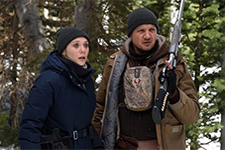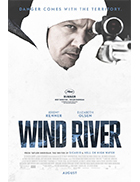Wind River
|  Wind River is the writing/directing debut of rising multi-hyphenate Taylor Sheridan, who until recently was known primarily as a character actor on television (notably on Veronica Mars and Sons of Anarchy), but has since made his name as an accomplished screenwriter, having penned the taut, brutal screenplays for Denis Villeneuve’s Sicario (2015) and David Mackenzie’s Hell or High Water (2016), the latter of which netted him an Oscar nomination. Sheridan had previously directed one film, the grisly horror entry Vile (2011), but Wind River has more in common, and is really of a piece, with the two films he has written, to the point that they can be considered a loose trilogy bound by shared themes about justice and retribution staged against environments of danger and despair (the U.S.-Mexico border in Sicario, the arid Texas Panhandle in Hell or High Water, and a frigid reservation in Wyoming in Wind River). With those three films, Sheridan has established a robust artist identity, and the strength of Wind River suggests that some of his best work may still lie ahead. Wind River is the writing/directing debut of rising multi-hyphenate Taylor Sheridan, who until recently was known primarily as a character actor on television (notably on Veronica Mars and Sons of Anarchy), but has since made his name as an accomplished screenwriter, having penned the taut, brutal screenplays for Denis Villeneuve’s Sicario (2015) and David Mackenzie’s Hell or High Water (2016), the latter of which netted him an Oscar nomination. Sheridan had previously directed one film, the grisly horror entry Vile (2011), but Wind River has more in common, and is really of a piece, with the two films he has written, to the point that they can be considered a loose trilogy bound by shared themes about justice and retribution staged against environments of danger and despair (the U.S.-Mexico border in Sicario, the arid Texas Panhandle in Hell or High Water, and a frigid reservation in Wyoming in Wind River). With those three films, Sheridan has established a robust artist identity, and the strength of Wind River suggests that some of his best work may still lie ahead.The film’s title derives from the Native American reservation in central Wyoming where most of the action takes place. The central character is Cory Lambert (Jeremy Renner), a hunter for the Department of Fish and Wildlife who gets drawn into a murder mystery when, while hunting a mountain lion that has been killing locals’ cattle, he discovers the body of an 18-year-old Native American girl in the middle of the wilderness. Although the girl technically died of exposure (the description of how the fluid in her lungs literally froze and killed her is chilling), the coroner finds that she had been raped, possibly by more than one person. She is barefoot when Cory finds her and there is a gash in her head, so she was clearly running for her life when she lost it. This particular death reopens a number of still raw scars for Cory, who lost his own teenage daughter under eerily similar circumstances three years earlier, an event that led to the destruction of his marriage to his wife Wilma (Julia Jones), a native from the reservation whose parents still live there. He and Wilma have a preteen son, Casey (Teo Briones), who Cory loves dearly, but you can sense that a large chunk of his soul has been decimated, and it is to Renner’s credit that he embodies the character’s sense of loss with such profound effectiveness beneath his rugged exterior. Even though he is not a member of the police, Cory is included in the investigation by Ben (Graham Greene), the reservation’s chief of police, and Jane Banner (Elizabeth Olsen), an agent dispatched by the FBI to investigate the death. Jane is no greenhorn, but she has no experience in the glacial Wyoming winter and doesn’t know anything about tracking. Cory is familiar with both the land and the people who live on it, so he is able to help guide Jane in her investigation, which brings them into contact with both Native Americans and white oil workers whose company is drilling on their land. Sheridan, who won the Un Certain Regard Best Director’s prize at Cannes, is both sensitive and shrewd in the way he interweaves political issues into the film’s murder-mystery trappings, using the desperation of the Native American characters as a pointed barb again the U.S.’s history of mistreating and exploiting them and the debauchery of the anxious oil workers to illustrate the fundamental callousness of Big Oil. Sicario showed the horrors of how ordinary people are caught in the cross-fire of the unwinnable cross-border drug war, while Hell or High Water aimed primarily at the money-driven cruelty of the banking industry and the dire straights into which it forces otherwise decent people. Seeing those films along with Wind River, it is clear that Sherdian is interested primarily in how so-called “little people”—the ordinary folks just trying to live their lives as best they can—get trampled by a system that favors entrenched powers that are willing and able to wage various kinds of war—physical, financial, environmental—for their own constant gain. As a filmmaker, Sheridan’s particular gift is his ability to thread these social and political themes into crackerjack narratives that are so enthralling in and of themselves that it’s easy to forget there is a social dimension, even if that dimension is crucial to the plot mechanics. His is able to convey meaningful themes without feeling preachy, to entertain while also, on some level, offering a bit of enlightenment. There isn’t always much hope at the end of his films (particularly that brutal conclusion to Sicario), but Wind River, manages to suggest a glimmer of something better down the road, even if it ends with a despondent title card informing us that Native American women are the one demographic group for which no crime statistics are kept, which means we have absolutely no idea how many of them have disappeared over the years. It is a reality both frightening and sad that Sheridan dramatizes with immense skill and empathy. Copyright © 2017 James Kendrick Thoughts? E-mail James Kendrick All images copyright © The Weinstein Company |
Overall Rating: 


 (3.5)
(3.5)


